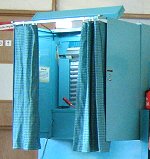- By Dan Veaner
- News
 Print
Print  Fire Commissioner Jeff Walters questioned the Lansing Fire District's voting plans at the commissioners' monthly meeting Tuesday night. Normally elections are held in Central Station on Ridge Road, as well as Station 5 on Oakcrest Road in the Village of Lansing. With low voter turnout for generally uncontested elections, Walters says the expense of maintaining two polling places is not justified. "I'm not opposed to doing it the way we do it, but I don't see why we can't do it at one location," he said. "I think it's a lot of money to spend in the Village."
Fire Commissioner Jeff Walters questioned the Lansing Fire District's voting plans at the commissioners' monthly meeting Tuesday night. Normally elections are held in Central Station on Ridge Road, as well as Station 5 on Oakcrest Road in the Village of Lansing. With low voter turnout for generally uncontested elections, Walters says the expense of maintaining two polling places is not justified. "I'm not opposed to doing it the way we do it, but I don't see why we can't do it at one location," he said. "I think it's a lot of money to spend in the Village."
Jeff Walters
Secretary Alvin Parker said it costs the district $100 per election inspector, plus $100 for the voting machine, plus incidental expenses. With two election inspectors per station, the total comes to more than $600. But Parker says that State Law allows fire districts to do everything themselves, using paper ballots. Parker said the district could economize by using one polling place with paper ballots and one election inspector, and by shortening the hours the polls are open to the minimum requirement of 6pm to 9pm.
But commissioners agreed that using a voting machine with two election inspectors is a better choice, because it reduces voter confusion and possible challenges to the vote results. "It's a lot of money, but you have less conflict if you have a machine," Walters said.

Jeff Walters
Voting at Station 5 in Lansing Village (shown above) may move to
Central Station on Ridge Road in the Town of Lansing
Lansing's Fire District elections take place in December, and the generally uncontested elections don't attract many voters because of the predetermined result. But commissioners say it is hard to get people to run. A fire commissioner's term is 5 years, so typically only one seat is up for election per year. This year Parker's term will be up, and he says he hasn't yet decided whether he will run again.
The old lever-style voting machines will be used this year, despite HAVA mandates to get electronic machines into the polling places. This is because the new machines have been held up by federal delays in getting a testing lab certified.
The commissioners decided to think about it before deciding how many stations to use, noting that they still have a couple of months before they have to commit to a plan. The question is whether or not the convenience of being able to vote in the Village is worth the expense, given that fewer than 20 voters typically take advantage of it. "We really don't get enough voters," noted District Treasurer George Gesslein.
----
v3i30



